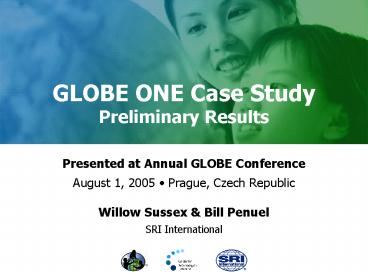GLOBE ONE Case Study Preliminary Results - PowerPoint PPT Presentation
1 / 14
Title:
GLOBE ONE Case Study Preliminary Results
Description:
GLOBE ONE Case Study. Preliminary Results. Presented at Annual ... Photos courtesy of ... Meeting Minutes (GLOBE ONE Weekly Telecon and PI Telecon, ... – PowerPoint PPT presentation
Number of Views:26
Avg rating:3.0/5.0
Title: GLOBE ONE Case Study Preliminary Results
1
GLOBE ONE Case StudyPreliminary Results
- Presented at Annual GLOBE Conference
- August 1, 2005 Prague, Czech Republic
- Willow Sussex Bill Penuel
- SRI International
2
GLOBE ONE Science Question
- For corn and soybeans, what are the environmental
impacts associated with different frequencies and
intensities of soil tillage farming, as compared
to prairie and urban sites? - Photos courtesy of Washburne, McLaughlin
3
GLOBE ONE Case Study Questions
- To what extent can GLOBE ONE serve as a model for
the GLOBE Program of students and scientists
working in partnership in an Earth systems
science field campaign? - To what degree can the engagement of scientists,
in combination with specific supports to
teachers, lead to more student-led
investigations? - How were scientists questions shaped by regional
characteristics, scientists collaboration with
one another, local sociopolitical forces, and
school realities?
4
GLOBE ONE as the GLOBE ideal
- Education and infrastructure goals
- Partner students and scientists in a
collaborative relationship to answer relevant
research questionsthe GLOBE ideal. - Build a model for other such projects involving
GLOBE protocols and schools. - Foster student research.
- Create a GLC where multiple community entities
collaborate to collect data. - Generate publicity and aid GLOBE in fundraising
and reaching out to the agricultural education
community. - GLOBE ONE White Paper, 2004
5
Data Sources
- Teacher Interviews (9, Fall 04, Spring 05)
- Scientist Interviews (16, Summer 04, Summer 05)
- Student Focus Groups (4, Spring 05)
- Partner Interviews (3, Summer 04, Spring 05)
- Community Member Interviews (2, Fall 2004)
- Meeting Minutes (GLOBE ONE Weekly Telecon and PI
Telecon, 9/04-Present) - Inquiry Workshop Data (Surveys, Inquiry Map
Forms, Observation Notes, Teacher Projects) - Iowa Newspaper Articles
- Student Research (Contrails)
- MUC-a-thon Materials
6
Data Sources Preliminary Analysis
- Teacher Interviews (9, Fall 04, Spring 05)
- Scientist Interviews (16, Summer 04, Summer 05)
- Student Focus Groups (4, Spring 05)
- Partner Interviews (3, Summer 04, Spring 05)
- Analysis based on Initial Coding Scheme,
including Student Research, Data Collection
and Data Entry and The Science of GLOBE ONE. - Please give us your input on the analysis.
7
Goal Partner Students and Scientists
- To what extent can GLOBE ONE serve as a model for
the GLOBE Program of students and scientists
working in partnership in an Earth systems
science field campaign?
8
Goal Partner Students and Scientists
- To what extent can GLOBE ONE serve as a model for
the GLOBE Program of students and scientists
working in partnership in an Earth systems
science field campaign?
9
Goal Partner Students and ScientistsA Model for
GLOBE?
- What are the successes of GLOBE ONE that
contribute to the model?
10
Goal Partner Students and ScientistsA Model for
GLOBE?
- What aspects of GLOBE ONE program implementation
could be improved?
11
Goal Foster student research.
- To what degree can the engagement of scientists,
in combination with specific supports to
teachers, lead to more student-led
investigations?
12
Goal Foster student research.
- Mixed success on student research. We know more
about how it can be done (inquiry workshop,
contrail study) but its too early to know the
effects of GLOBE ONE on student research. - Inquiry workshop provided teachers with tools for
fostering student research BUT not all GLOBE ONE
teachers attended (2 of 7). - Students are asking questions about the data BUT
few are doing research projects yet.
13
Summary
- GLOBE ONE made science more personal for
students. Teachers and students understood that
their work was contributing to a larger study and
were motivated as a result. - Motivation to participate stemmed largely from
scientist visits and the perception that students
were participating in real science that brought
real scientists to Iowa. - Participation at the school level still largely
focused on data collection. - Scientists are positive about publications that
can result from the data.
14
Recommendations for NGG
- Encourage personal connections between students
and scientists helps motivate data collection. - Student datagiven the constraints of the
curriculum and schedulemay never be enough on
their own to support the project. - For students, the benefits are that it helps them
identify with scientists and science. - GLOBE needs a wider array of resources for
supporting student inquiry - Offer inquiry workshop early in projects, and
ensure participation of project teachers - Teachers and students dont always know how to
approach the task of data analysis and need more
tools and support.
Photos courtesy of Washburne, McLaughlin































